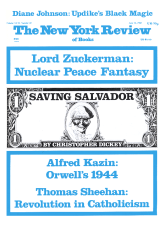In response to:
Israel in Embryo from the March 15, 1984 issue
To the Editors:
Conor Cruise O’Brien, in his admirable review of my history of the Balfour Declaration, The High Walls of Jerusalem [NYR, March 15], raises a strong objection to this paragraph, which, as he notes, appears on page 615 of the book:
The argument for winning American-Jewish support of the Entente also had become irrelevant [by November 9, 1917]. Oddly, little excuse for the declaration was left outside of the idealism that above all had motivated its principal makers.
Mr. O’Brien goes on to assert that this passage “throws the weight” of my book behind the thesis “that the British government, in adopting the Balfour Declaration, was not really thinking, or not thinking seriously, about British interests,” and to suggest that I am ascribing the event “just to the idealism, romanticism, or sentimentality of British politicians.”
I should think the page number alone would indicate that my book weighs a good deal more than that paragraph by itself, and the interpretations it might yield when taken out of context. On the question of idealism and its relation to British interests in 1917, Mr. O’Brien himself writes: “There was no contradiction between a belief in Zionism, as a good thing in itself, and a belief that a Zionist declaration might help Britain win the war. On the contrary, the two beliefs went easily and naturally together.” Proof of this observation can be found throughout my book, which shows the supporters of Zionism in the government constantly making British interests part of their calculations.
Mr. O’Brien even agrees with me that (as he writes) the “determined personal and philosophical commitment to Zionism of the then foreign secretary, Arthur Balfour” was of considerable significance in the outcome. A similar commitment can be seen, as my book shows, in such other “principal makers” of the Declaration as Sir Mark Sykes and Herbert Samuel, as well as Leopold Amery, Sir Ronald Graham, and even arguably Lord Milner. Admittedly, Lloyd George is a more ambiguous phenomenon; but even many of his moments of greatest craftiness regarding Palestine seem at least partially inspired by a quasireligious enthusiasm, as when he spoke out against letting it fall into the hands of “Agnostic Atheistic France.” The crux of the problem seems to be in my use of the term “above all”: I’ll stick with it, but I think that any reader who wants to disagree with that philosophical emphasis will find ample evidence in my book for doing so as well.
As for the sentence about American-Jewish support, my point—clear enough in the context of the book—was that British concern over it had been very largely alleviated by the entry of the United States into the war the previous April. The Foreign Office papers for 1916 show a considerable preoccupation with anti-Entente feeling among the Jews of a still-neutral America, and with how a declaration on Palestine might win them over, but this all but disappears completely after the American declaration of war. I agree with Mr. O’Brien that a good study is needed of the impact of the Balfour Declaration on Anglo-American relations; but as for the Declaration’s impact on American-Jewish atitudes toward the Entente, such a study would have the difficult task of distinguishing the effects of that impact from those of the downfall of Tsarism in March and the American declaration of war in April. These events had converted many American Jews into supporters of the Entente long before the Balfour Declaration came along.
Ronald Sanders
New York City
Conor Cruise O’Brien replies:
I appreciate the generous spirit of Mr. Sanders’s reply to my review. On the whole, I would stand over my criticisms, but I hope as many NYR readers will read Mr. Sanders’s instructive, and often entertaining, book for themselves, and make up their own minds.
This Issue
June 14, 1984



